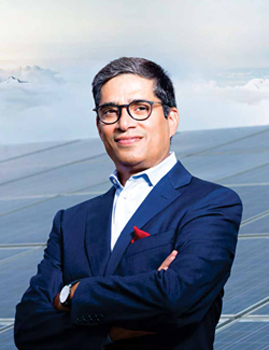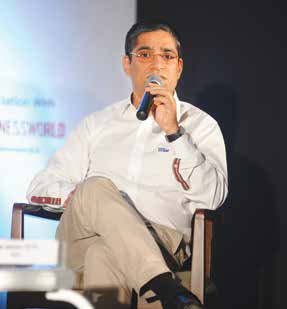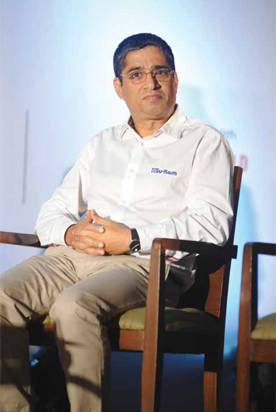A true risk taker and visionary, Kunwer Sachdev set his sights on the power back-up sector, leaving behind an already established business. He did not let the absence of a degree in technology come in the way of his ambitions. Today, the founder and Managing Director of Su-Kam Power Systems, Kunwer Sachdev is an unrivalled force in the power back-up sector, who has proven that an idea is bigger than a degree. He speaks to Corporate Citizen about his career growth and success

At the age of 15, I joined my elder brother in selling pens. Little did I know that this small entrepreneurial experience would sow the seeds for what I was to do later in life. We used to buy pens from wholesalers and sell them to retailers around Delhi, riding a bicycle. It was a taxing job but for a 15-year-old boy, it was a rather exciting experience. Now, I feel those were golden days as I learnt so much at a very young age. I remember I used to dream of starting my own brand of pens.
After completing my education in Mathematical Statistics from Hindu College and LLB from the University of Delhi, I joined a cable telecommunications company in Delhi as a sales executive. But I was never satisfied with my work as the entrepreneur in me wanted to start something on my own. But it was a big risk for me. Coming from a middle class family, I did not have rich parents or fancy degrees.
But I somehow took the plunge and after working in the job for two years, I left it to start my own cable TV business. With seed money of Rs.10,000 mostly borrowed from friends, I started Su-Kam Communication Systems from a small office in Delhi. I had a few employees who were not very qualified in the traditional sense but were extremely hardworking, and most importantly, they believed in my vision. I started with installations of CATV and MATV systems in hotels and multistorey buildings. As I was unaware of the nitty gritty of the installation process, many people conned me. After being swindled several times, I learnt my lesson and started going with people and began installing the equipment with them. This not only gave me hands-on experience, but also helped me learn more about the process and equipment.
I tried to gain knowledge and clear basic concepts by reading voraciously. I even read school physics books! Luckily for me, in the 1990s, cable TV became a necessity in every home and my business took off. By then, I had thorough knowledge of the subject and even I tried to gain knowledge and clear basic concepts by reading voraciously. I even read school physics books! Luckily for me, in the 1990s, cable TV became a necessity in every home and my business took off. By then, I had thorough knowledge of the subject and even trained my staff. We manufactured cable TV equipment like directional couplers, amplifiers, and modulators.

An entrepreneur’s journey is full of risks and mine was no different because after setting up a profitable cable TV business, I saw a lot of potential in the power back-up industry and ventured into it head on. In the 1990s, power was a constant worry in every Indian household; prolonged blackouts and unreliable power source was dampening the ambitions of the growing middle class.
I had an inverter in my office that constantly broke down. We used to call a technician who repaired it but after a few days, it would break down again. Frustrated, I opened it up one day and discovered that the inverter was made up of substandard parts. This triggered in me an idea to manufacture an inverter that was way ahead of the ones available in the market in those days. For two years, my R&D team and I worked on this inverter. We even imported European and American inverters and studied them carefully. Several times we failed, but eventually we succeeded in developing an inverter that was superior in technology and could withstand the rugged Indian conditions.
Shutting down my cable TV business at the height of its success was a big risk. But I realised that the power back-up industry was an untapped market and was going to see a big boom. So in 1998, I started Su-Kam Power Systems. Within a few years, I realised that the power crisis in India is only the tip of the iceberg. In India, power is a political issue rather than an availability issue. With an expanding economy, the demand for electricity has amplified manifold and will only increase in the future.
In such a situation, we need power that is sustainable and cheaper. Renewable energy is the only alternative to suffice the growing energy demand without any carbon footprint. As India is blessed with ample sunshine, solar energy is the only answer to India’s energy woes. Since the technology behind solar and inverter is not very different I knew we could easily delve into this sector. We already had the right manpower, technology and infrastructure, so venturing into solar industry was not very difficult for us. We were one of the first Indian power back-up industries to venture into the solar sector and have made several innovations in this sphere.
“Su-Kam became the first inverter company to advertise in newspapers. Before our entry into the power solutions sector, no company had a proper manual or catalogue of products, but we changed that as Su-Kam came up with creative marketing collateral for all its products”
When I entered the inverter market, it was dominated by innumerable players but they were all local manufacturers who were making substandard products. The inverter market back then was untapped with huge potential for growth in keeping with India’s accelerated development at the time. I was not threatened by them so to say, but the bigger challenge lay in building a product that was far superior to theirs.
I feel you do not have to have technical background to start a tech-based company. Of course, having a sound knowledge can make things smoother, but in the end, it all boils down to your level of interest. I owe it to my zest for learning. It wasn’t easy though. I had to start from scratch as I had no formal education in this field, but I kept learning along the way. Since childhood, I have been an inquisitive person and enjoy learning new things. So I guess my eagerness to learn fuelled my interest in this field. And once I started out, there was no looking back, it just kept pulling me, and with that, my interest grew further.
Another important factor is as I said earlier, I was a novice when I started my cable communications company, so a lot of people fooled me. So I had no choice but to learn the business in and out by going for installations myself. I knew if I were to make an impact in the inverter industry, then I would have to learn everything about it, and that’s what I did.
“The power crisis in India is only the tip of the iceberg. In India, power is a political issue rather than an availability issue. With an expanding economy, the demand for electricity has amplified manifold and will only increase in the future”

Taking risks is a part and parcel of an entrepreneur’s life. Without risks, you cannot think of creating something new. I had accepted this early on in my career. Since we make so many innovations, each new product that we build is a risk, we have no inkling about how well it will be accepted in the market. We just give our everything into making a product.
Whenever I have a new idea for a product, I share my vision of a product with my R&D team and we quickly start working on it. After a lot of hard work when the product starts taking some shape, we work on improvising it. Sometimes, we start without much planning, but as we work on the project, new ideas get added. Both the plastic-body inverter and Home UPS are a revolution in its domain. Months of hard work have gone into it. But what makes us happy at the end of the day is a product that gets accepted by the masses.
Whenever we embark upon something new along with hard work, a lot of money is also involved. So the risks are even higher. But as is the way of life, some products fare better than some. When we fail, we just learn from our mistakes and move on.
Making a brand successful is not the work of one person. A lot of people are involved in making it a success, from the top management to the service personnel. Throughout my career, I have been blessed to have had the opportunity of working with some of the best staff who believed in my vision and stood by me through thick and thin. The success of Su-Kam belongs to all those people who have worked towards making it what it is today.
I realised the importance of marketing quite early on. Su-Kam became the first inverter company to advertise in newspapers. Before our entry into the power solutions sector, no company had a proper manual or catalogue of products but we changed that as Su-Kam came up with creative marketing collaterals for all its products. We tried to employ unique marketing strategies to attract customers. In the late ’90s, we persuaded dhaba owners around Delhi to put their dhaba name on Su-Kam. It was a win-win situation as they were getting a board for their dhaba and we got to promote our brand. It proved very successful and soon, many other brands followed suit. The idea of advertising on shikaras came to me when I visited Dal Lake on a vacation. The next day I persuaded the shikara owners to put Su-Kam branding and the rest is history.
We have always strived to make products that are useful or worthwhile for the customers. Almost every Indian household owns an inverter, but when the customer wants to install solar, he has to buy a new solar inverter and discard his old inverter. This was stopping people from going solar. We thought that if we can build a product that can be installed with an existing inverter and battery and turn it into a solar system, then this would negate the problem of going for a new solar inverter and save the customer’s money. So we designed Solarcon that lets the customer use solar energy generated by solar panels to power all electrical equipment. This way, one can make huge savings on one’s electricity bill and get to charge the batteries even during power cuts, and of course, help save the environment.
At Su-Kam, we have a culture of grooming fresh talent. Within our organisation, there are people who have started from a junior position and have been given bigger responsibilities based on their talent and hard work and not qualification. Our country has a lot of talented youth, they just need the right platform to nurture their potential. To some extent, reality shows help doing that. So, we embarked on a one-of-a kind reality show that seeks fresh talent. This show was aired on ETV and garnered a lot of appreciation. We were looking for candidates who were driven, intelligent and were problem solvers.
We are bullish in driving the solar rooftop segment and the electric vehicle. We are already working very aggressively on EV (Electric Vehicle) because we understand it is the future. Our R&D is very strong in this domain and we’ve have already designed a lot of components and devices for it. We are also getting into lithium-ion battery as energy storage is the next big thing.
We knew from the very beginning that our cutting- edge technology is what will make us stand out from the rest. So, we made this our mantra, right. We invested in a separate R&D unit, the first of its kind in the industry, which has won recognition from the Department of Scientific and Industrial Research, Government of India. Combining the strength of our skilled manpower and innovation, we started designing products that catered to the Indian needs. With the R&D’s consistent efforts we kept on making innovations, and soon Su-Kam became synonymous with innovation. We are also credited with transforming the chaotic inverter market into an organised sector. The Indian Inverter industry is one such industry where China hasn’t dared to enter. We have set such high standards that they have not been able to set foot in this industry. Not just in India, but also in the overseas market like the Middle East, African countries, South-east Asia, Nepal, Afghanistan and Bangladesh our inverters reign supreme. Our products are loved and much preferred over other brands in all these countries.
We have a record for being the only company in this field to file for so many patents. Su-Kam has over 81 Technology patents, 194 Copyrights, 136 Trademarks and 89 Design patents to its credit in India, USA and other countries. Today, nearly two technology patents are filed in a month. Even in solar, we filed for patents way back in 2006 when nobody in the industry even gave a second thought to it. Since we have so many wonderful innovations, it is but natural that we want to safeguard them against any infringement. However, due to the government’s laxity in granting patents, many of them are still in the preliminary stage. But in the past one year, we’ve seen some progress as many of our patents were granted.
Some of our technology patents are very much relevant in the solar and Electric Vehicle industry. This will enable us to be ahead of the curve. With these patents, Su-Kam can be a game changer in the future of the power backup industry, be it EV or storage industry.

It’s a general perception that having an MBA degree is essential for becoming a successful entrepreneur. Young people flock to obtain flashy degrees, but does it really help? I don’t think so. Having said that, I have nothing against MBA graduates, I have many talented employees in my organisation who hold this degree. But what I am trying to point here is that knowledge alone is not sufficient, you must have the right attitude. Success comes when you know how to handle challenges and create challenges. For me, being an MBA is to be a good manager who is a problem solver and can manage people. He or she understands business, profit & loss, product & services, and the market. He or she knows how to become a role model, is constantly motivating people and is keen to learn and improve. Above all, an MBA is a good leader.
Armed with a passion to innovate, an entrepreneur must also possess the courage to imagine and think differently no matter what people say. Growing up in the alleys of Punjabi Bagh in West Delhi, I didn’t let my situation or financial constraints stop me. I loved to let my imagination wander and dream of the impossible. When I decided to get into the power back-up industry, I had a tough choice to make; closing down a business where I made my first million and treading into an unknown domain was a huge risk. But I had full faith in my vision and I convinced my team. Look where we are now. So an entrepreneur must dare to think differently and have conviction in his/her ideas.
I’ve learnt that challenges are a part of an entrepreneur’s day-to-day life, because whenever you embark on an untrodden path, you are bound to face innumerable obstacles. I have faced countless challenges in my career and I face them even now that I have an established business. But I have learnt to be unfazed by the obstructions that come my way. Instead, I think of ways to solve them. Even as a college student, my friends and classmates came to me whenever they had any problem. Today, I am solving problems of my employees and business partners. I think my problem solving approach to life has helped me reach where I am today.
“I’ve learnt that challenges are a part of an entrepreneur’s day-to-day life, What lessons have you learnt while traversing such a long, successful entrepreneurial journey? because whenever you embark on an untrodden path, you are bound to face innumerable obstacles. I have learnt to be unfazed by the obstructions that come my way. Instead, I think of ways to solve them”
I believe in living healthy, so I choose to exercise in my free time. I usually go for long walks in the mornings and evenings. Sometimes, I do yoga in the morning. Exercising keeps both the body and mind healthy and I feel it is especially important for entrepreneurs to incorporate exercise in their daily lives as it clears the mind, and only with a clear mind can one think out of the box. Swimming is my passion, although I learnt it much later in life. It is like meditation for me. I can mull over things and find a solution to various problems when I’m in the pool.
By Namrata Gulati Sapra